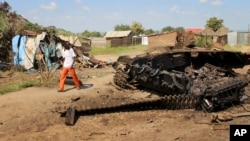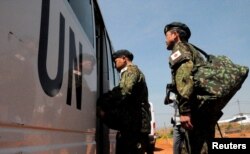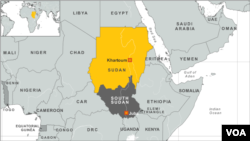The United Nations Security Council has rejected a U.S.-drafted resolution to impose sanctions and an arms embargo on South Sudan.
The measure received seven votes in favor, while eight countries abstained. The resolution needed nine votes to pass, as well as no vetoes by permanent council members.
Russia, China, Japan, Malaysia, Venezuela and three African council members — Angola, Egypt and Senegal — all abstained.
The U.S. ambassador to the United Nations, Samantha Power, said the United States is "extremely disappointed" by the outcome of the vote, but not surprised.
"We are very, very worried about what lies ahead and we think it's very important that peoples' votes are now on the record. When the U.N. is warning genocide, eight countries chose not to be counted when it mattered for the people of South Sudan," she said.
‘Deeply disappointed’
The United States, backed by Britain and France, had argued that the resolution would have helped to cut arms sales to South Sudan and was a necessary step to take in light of U.N. warnings of mass atrocities.
The U.N. says Secretary-General Ban Ki-moon, who has warned that South Sudan is on the verge of genocide, was "deeply disappointed" in the vote. A U.N. spokesman said the secretary-general was disappointed that "the council would not take this obvious and necessary step to help avert such a situation."
Opponents of the sanctions said the United States was ignoring South Sudan President Salva Kiir's recent speech to parliament calling for a national dialogue to restore peace, and said his initiative should be given a chance.
Japan, which has 350 troops serving in the U.N. mission in South Sudan, also argued that the resolution would have antagonized Kiir's administration and could have put peacekeepers at risk.
Human Rights Watch criticized the move to defeat the resolution. "The Security Council had an opportunity to show that it stands with the civilian victims of this conflict," said Akshaya Kumar, deputy United Nations director at Human Rights Watch. "Instead, this failure gives the warring parties in South Sudan a green light to buy more weapons and material that will end up being used against civilians."
U.N. peacekeepers
The Security Council unanimously extended its peacekeeping mission in South Sudan for another year a few days ago. The mission covers a new regional force of 4,000 troops, which the council approved in August but have yet to be deployed, in addition to the approximately 13,000 peacekeepers already there.
The relationship between South Sudan's government and the U.N. mission has been tense. South Sudan initially rejected a U.S. proposal to deploy an additional 4,000 peacekeepers in the wake of the fighting in July, but now has agreed to allow them, even though the technicalities are still being worked out.
South Sudan became the world's youngest nation in 2011 when it gained independence from Sudan. Hopes were high that South Sudan could leave behind decades of civil war with Sudan. In 2013, however, South Sudan descended into a new war stemming from political rivalry between Kiir, an ethnic Dinka, and his former deputy, Riek Machar, an ethnic Nuer.



